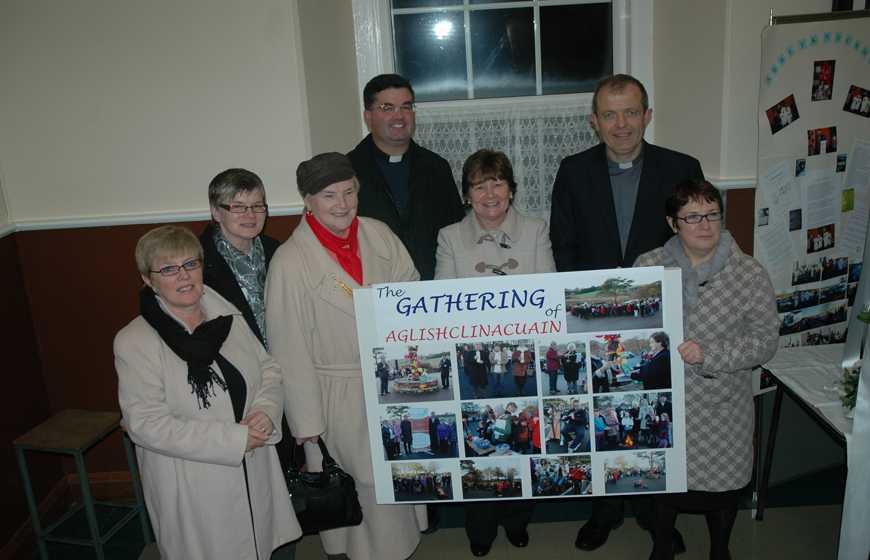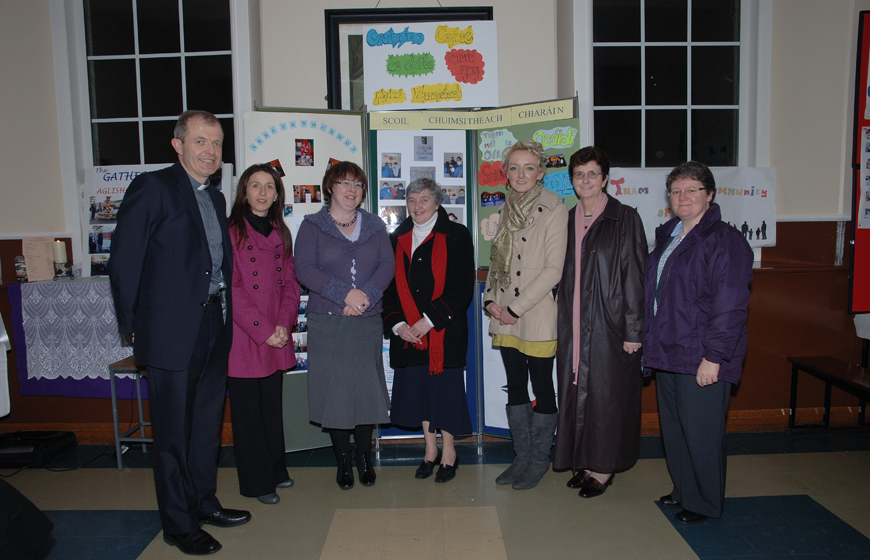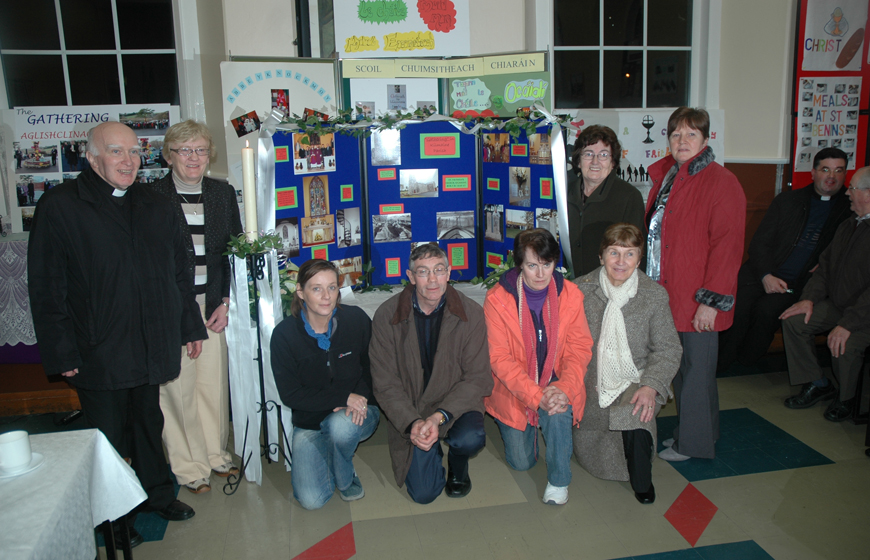The 50th international Eucharistic Congress will be held in Dublin in Summer of 2012. Each diocese is to have various events to prepare for this event in order to deepen and renew people’s understanding and appreciation of the Eucharist. On Sunday, November 28th such an event was held in Tuam Cathedral. People from all over the diocese gathered, despite the treacherous weather conditions, due to early snow and ice, to celebrate Mass and afterwards met in St. Jarlath’s College to view presentations on the them of ‘gathering’ that had been prepared by parishes and schools from all over the diocese.
Gallery Number 2 – View further pictures on links below – Pictures Courtesy of Mr. Jarlath Canney, Tuam
Gallery Number 3 – Procession at beginning of Mass
HOMILY of Archbishop Michael Neary a special celebration in preparation for the Eucharistic Congress of 2012
1st SUNDAY OF ADVENT.
Gathering is the theme of our celebration this evening.
We gather for sporting events, for baptisms and marriages. As neighbours and friends we gather at funerals. This evening we gather for worship. We move from other occupations, places and concerns to a unity in worship, which is based in a common Christian identity. There’s a transition and an integration involved. There are three aspects to our gathering: the arrival/welcome, the establishing of identity, and the beginning or opening prayers. We gather under the sign of the cross which expresses our relationship with the Trinity, Father, Son and Holy Spirit and establishes our deepest identity. Signing ourselves with the sign of the cross signifies wiping away our selfishness and freeing us for love; renouncing what is empty, renouncing prestige and the longing to possess and dominate in order to be available to Christ and to others. Our gathering calls for an unbiased heart, a wholesome attitude, a propensity towards goodness.
In our gathering here in our Cathedral Church of our Archdiocese we are following in the footsteps of those who have gone before us. They gathered in Churches, at Mass Rocks, at Station Masses to do what we are doing now, to celebrate to Christ in our midst.
The journey of preparation for the 2012 Eucharistic Congress has begun. This autumn we reflect on the theme of gathering. After this ceremony you will have the opportunity to see displays and presentations in St. Jarlaths’ College of the various gatherings that have taken place in schools and parishes throughout the diocese. Included among these displays are photographs of people gathering around the kitchen table for the neighbourhood station mass, parishioners gathering in their local church for Sunday mass, people gathering at ancient sites such as Holy wells, Mass Rocks and Monastic sites, places which link us through faith and geography with the generations who have gone before us. I want to pay tribute today to the manner in which Priests, teachers, Pastoral Councils, Eucharistic adoration groups and the people of God in our parishes around the diocese have responded to this invitation. Your response is testimony in itself to the faith which you hold dear and to your desire to deepen that faith in the Eucharist and make its celebration more meaningful for our times.
Yes, the journey of preparation has begun but my hope is that this journey of preparation for the Eucharistic Congress will bear fruit not just in the thousands of pilgrims from Ireland and from all over the world who will assemble in Dublin from June 10 to 17th 2012 but in a renewed understanding of what it is we celebrate each time we gather as communities to celebrate mass together. After all this is the purpose of a Eucharistic Congress; to deepen our understanding of the mass and to see how what we celebrate at mass is truly the source and summit of all our activity as Church and as the people of God. It is the source because around the table of the word and Eucharist we have the scriptures opened to us and we are fed at the table of the Lord just as the disciples were nourished along the road to Emmaus and were enabled to recognise Jesus in the Breaking of Bread. This is my hope for the journey which has begun this autumn in our diocese and will continue over the next two years. Each of the four stages of preparation, representing the four parts of the mass are designed to help us in realising that hope.

There may be the temptation to look back to Congress of 1932 and to compare those celebrations with our time. This Eucharistic Congress, if it is to be effective, must be a Congress of our times facing the challenges which our Church now faces and harnessing the opportunities offered to us today.
The Gospel reading today presents us with Jesus’ feeding of the 5,000. Jesus’ identity is revealed in what he does and what he calls others to do. This Gospel illustrates an exercise of hospitality on the part of Jesus. The twelve behave in a very practical way. The day is drawing to a close and they remind Jesus that the people who have followed him to a lonely place have nothing to eat. They urge Jesus to send them away but for Jesus the duties of hospitality are not so swiftly ended. He challenges the disciples “you give them something to eat”. Baffled, they protest: they have only five loaves and two fish – or does he mean that they should go and buy food for all the people?
Noteworthy in this Gospel is the fact that Jesus does not himself deal directly with the crowd. Rather, he makes it possible for the twelve to provide the hospitality that initially they had found so daunting. Here the episode is shot through with symbolism for the life of the later Church. When the earthly ministry of the Jesus is over and he has returned to his Father in the Ascension it will be the disciples who will continue his hospitality. The gestures of Jesus as he multiplies the loaves and fish (taking, blessing and breaking) echo the Eucharistic narrative. This feeding miracle anticipates the Eucharist, where sacramentally the Church will celebrate and offer the hospitality of God.
The practice of hospitality gives witness to the power of the Gospel to create community. Christians open their doors to others, social barriers between rich and poor, native and newcomer are torn down. In the Eucharist, we declare the power of reconciliation to a fragmented society.
In our country today we are deeply conscious of such a need. We are not alone in this journey of preparation. Dioceses all over the country have begun their preparations for Congress 2012. Coordinating much of the preparation in dioceses throughout the Country is Collette Furlong who is Pastoral Development Officer for the Congress. We are delighted to welcome Collette to Tuam today and I now invite Collette to share some thoughts on Gathering and on the remaining stages of preparation for the Eucharistic Congress.
The way in which Luke has structured the sending out of the twelve and the feeding miracle reminds us that the preaching of the Gospel can never be separated from care for social and physical needs.










































